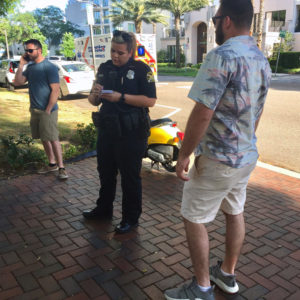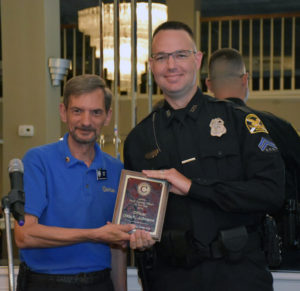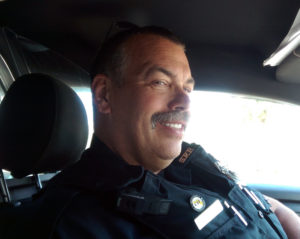
“I wanted to be able to tell the good stories, too,” says McWade, shown interviewing two men after a reported hit-and-run.
By JONAH HINEBAUGH
USFSP Student Reporter
ST. PETERSBURG – When police officer Dagni McWade isn’t working at the St. Petersburg Police Department, she’s dealing with a Felony.
No, not the criminal charge. Felony is the fat English bulldog she shares with her boyfriend of two years.
During her shift on March 30, her boyfriend was having trouble hanging curtains in their new home, which kept him pestering her over the phone.
But he has no trouble as an undercover vice and narcotics agent for the department. The two met while on the same squad before he moved to that division.
As corny as it sounds, McWade said, she always wanted to make a difference.
Her first venture was studying elementary education at St. Petersburg College. When she realized she didn’t agree with the rigidity of the curriculum, she dropped out and followed in her father’s footsteps, which led her to the Police Department.
Her dad spent 29 years at the department and now serves as assistant chief in Bradenton.
“My dad never complained and always told the good stories you don’t really see in the media,” McWade said. “Part of my draw (to law enforcement) was a fear of missing out. I wanted to be able to tell the good stories, too.”
She spent three years in the communications unit before moving to patrol, where she serves the Old Northeast area.
Between 2 p.m. and midnight on March 30, she fielded two calls from a 96-year-old woman who vaguely complained of hearing drums from her condo. There isn’t much the police can do about that on a Saturday afternoon in downtown St. Petersburg, McWade told her.
While the elderly complain about noise, the younger set usually causes it. McWade responded to a drunken brawl involving approximately 20 people at the popular bar Park & Rec on First Avenue S.
She said when dealing with calls, it’s all about respect on both sides – and running your mouth will only land you in jail.
She joked that sometimes when she encounters people drinking in public, “It’s like kicking their beer over is more painful than going to jail.”
The lower-income side of the downtown area surrounds St. Anthony’s Hospital partly because there is a homeless shelter one street over.
As she drives past, McWade sees drug use, alcoholism and contempt.
On one call, she encountered a man who wanted to be hospitalized under the Baker Act. He said he was hearing voices – the same claim he had made in a call to police a few days earlier.
Some of the people who call police repeatedly just want some attention, McWade said.
Police officers are required to take people like that man to either the psychiatric ward of St. Anthony’s Hospital or – if they’re deemed not a threat to themselves or others – to an organization called Personal Enrichment Through Mental Health Services.
PEMHS used to have a facility on Ninth Avenue N. The closest facility is now in Pinellas Park, a 20-minute drive in light traffic, so a trip to PEMHS ties up officers for at least an hour.
McWade’s most frequent calls are for domestic disturbances. Such a call came in the evening of March 30, when neighbors were worried about a 16-year-old boy’s safety after his parents were, in their words, “punishing him.”
Some people think cops are lazy, McWade said. Some think they are an authoritarian terror.
“People think (officers) can’t be normal, like we all have to be white supremacists,” McWade said. “We’re just a doing a job and, like journalists, we’re stereotyped because it only takes one bad representative.”





